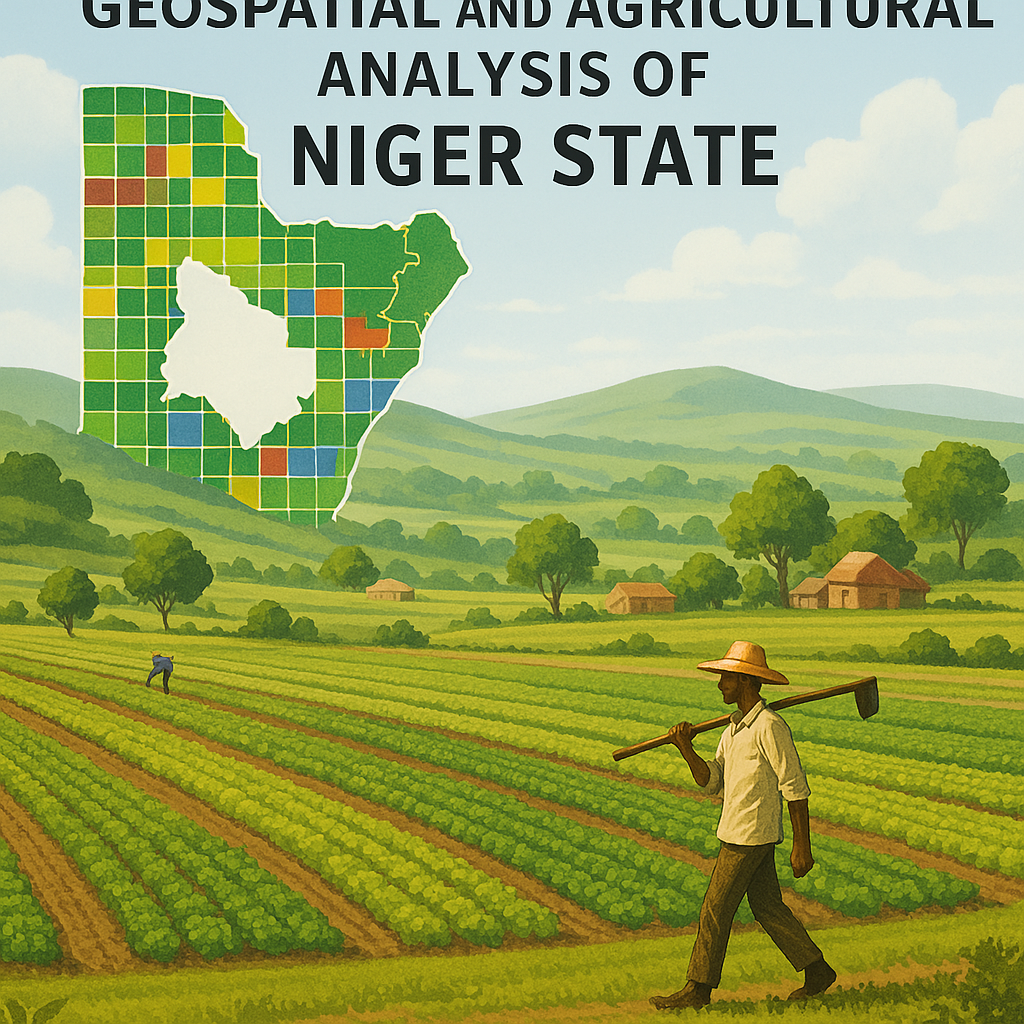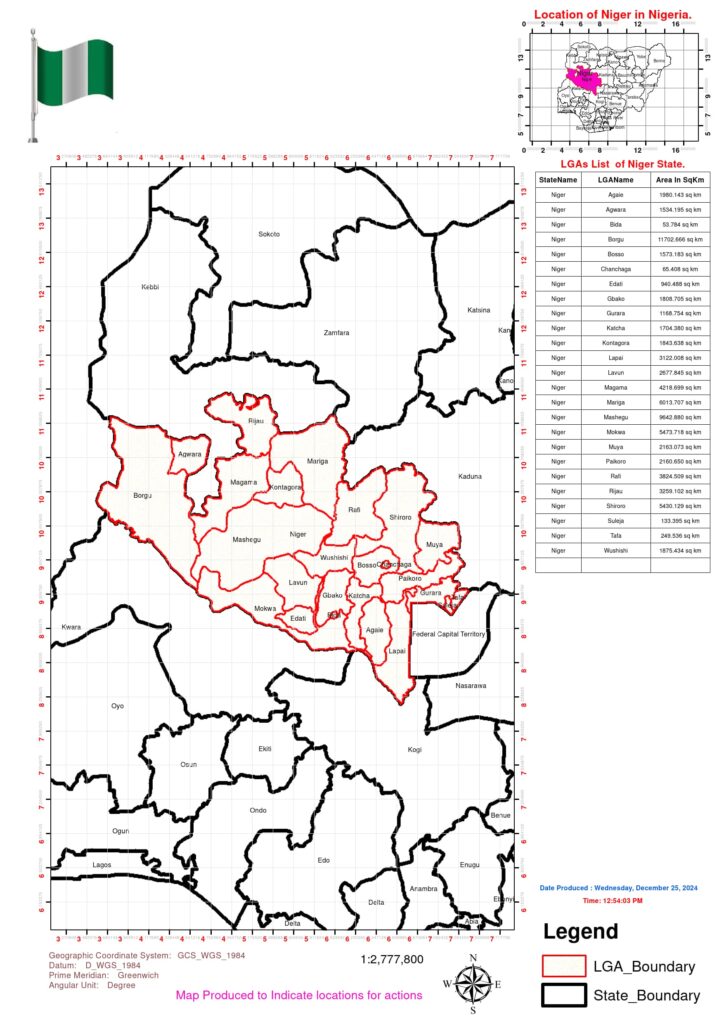
of
Niger State
A Comprehensive Framework for Sustainable Livestock and Crop Production"
 Niger State often referred to as the “Power State” of Nigeria, is a land of immense agricultural potential and natural resources. With a population of approximately 6.78 million and a vast land area of 76,469.903 square kilometers, 85% of which is arable, Niger State is strategically positioned to become Nigeria’s largest agricultural hub. The state boasts a tropical savanna climate, characterized by distinct wet and dry seasons, with annual rainfall ranging from 1,100mm in the north to 1,600mm in the south. This climatic diversity, coupled with fertile soils such as Ferric Lixisol, Nitisol, and Fluvisol, makes Niger State ideal for a wide range of agricultural activities, including crop cultivation, cattle breeding, and livestock farming.
Niger State often referred to as the “Power State” of Nigeria, is a land of immense agricultural potential and natural resources. With a population of approximately 6.78 million and a vast land area of 76,469.903 square kilometers, 85% of which is arable, Niger State is strategically positioned to become Nigeria’s largest agricultural hub. The state boasts a tropical savanna climate, characterized by distinct wet and dry seasons, with annual rainfall ranging from 1,100mm in the north to 1,600mm in the south. This climatic diversity, coupled with fertile soils such as Ferric Lixisol, Nitisol, and Fluvisol, makes Niger State ideal for a wide range of agricultural activities, including crop cultivation, cattle breeding, and livestock farming.
Under the visionary leadership of Governor Mohammed Umar Bago, Niger State is undergoing a transformative agricultural revolution aimed at achieving food security, reducing post-harvest losses, and improving livelihoods for smallholder farmers. The state is implementing a comprehensive grains value chain initiative, targeting 2 million smallholder farmers by 2030, with a focus on women and youth empowerment through aggregation and trade schemes. Key strategies include the introduction of high-yield, drought-tolerant crops, the provision of microcredit for agricultural inputs, and the deployment of cutting-edge digital tools like virtual agronomist advisory services. Additionally, significant investments are being made in climate-proofed warehousing, cleaning, and drying infrastructure to reduce post-harvest losses, which currently average is 20%.
Niger State is also leveraging geospatial technology to optimize its agricultural practices. Through advanced GIS and remote sensing tools, the state is conducting land suitability analyses for feedlots and pastures, monitoring pasture health,

and optimizing feed supply chains. These efforts are complemented by drone surveys, soil analysis, and predictive crop yield modeling, ensuring data-driven decision-making and sustainable resource allocation. The integration of geospatial data with stakeholder inputs is further enhancing the state’s capacity to implement effective agricultural policies and infrastructure development. With its rich natural resources, including significant water bodies like the Niger River and Kainji Dam, and a commitment to sustainable development, Niger State is poised to lead Nigeria’s agricultural transformation. By aligning its initiatives with the Sustainable Development Goals (SDGs), particularly No Poverty, Zero Hunger, Gender Equality, and Climate Action, Niger State is not only addressing local food security challenges but also contributing to global efforts to create a more sustainable and equitable food system. Through innovative policies, strategic partnerships, and a focus on inclusivity, Niger State is setting a benchmark for agricultural excellence in Nigeria and beyond.
Niger State represents a compelling investment destination for Foreign Direct Investment (FDI) in agriculture, offering unparalleled opportunities for sustainable growth, profitability, and impact. With its vast arable land, abundant natural resources, and strategic location, the state is poised to become a leading agricultural hub in Nigeria and across West Africa. The geospatial and agricultural analysis presented in this document highlights the immense potential of Niger State’s agricultural sector, while also identifying actionable pathways for investors to unlock this potential and achieve significant returns.
For foreign investors, Niger State offers a unique value proposition:
- Untapped Potential: With 85% of its land arable and only 1% currently irrigated, Niger State presents vast opportunities for expanding agricultural production, particularly in high-value crops and livestock.
- Favorable Climate and Soil Conditions: The state’s tropical savanna climate, fertile soils, and abundant water resources create ideal conditions for diverse agricultural activities, from crop cultivation to cattle breeding and fattening.
- Government Commitment: Under the leadership of Governor Mohammed Umar Bago, Niger State is implementing transformative policies and infrastructure projects to support agricultural development, including climate-proofed warehousing, mechanized farming, and value chain integration.
- Market Access: Proximity to key markets such as Lagos, Abuja, and neighboring countries positions Niger State as a strategic hub for regional and international trade.
- Sustainability Alignment: Investments in Niger State’s agricultural sector align with global sustainability goals, including food security, climate resilience, and inclusive economic growth, making it an attractive option for socially responsible investors.
Foreign investors can play a transformative role in Niger State’s agricultural sector by:
- Developing Infrastructure: Investing in irrigation systems, storage facilities, and processing centers to reduce post-harvest losses and enhance value addition.
- Introducing Advanced Technologies: Leveraging precision agriculture, drone technology, and digital platforms to optimize productivity and resource efficiency.
- Building Capacity: Partnering with local stakeholders to provide training, technical assistance, and access to finance for smallholder farmers and agribusinesses.
- Promoting Sustainable Practices: Supporting climate-smart agriculture, renewable energy solutions, and soil conservation initiatives to ensure long-term sustainability.
- Expanding Market Linkages: Facilitating access to domestic and international markets through improved logistics, quality standards, and trade partnerships.
The time to invest in Niger State is now. The state’s agricultural sector is ripe for transformation, and early movers will benefit from first-mover advantages, including favorable government incentives, untapped market opportunities, and the potential for high returns. By investing in Niger State, foreign investors can not only achieve significant financial gains but also contribute to sustainable development, job creation, and poverty alleviation.
Niger State is more than an investment destination—it is a gateway to Africa’s agricultural future. Together, we can unlock its potential, drive economic growth, and create a legacy of prosperity for generations to come. Let us seize this opportunity to build a brighter, more sustainable future through strategic investments in Niger State’s agricultural sector.